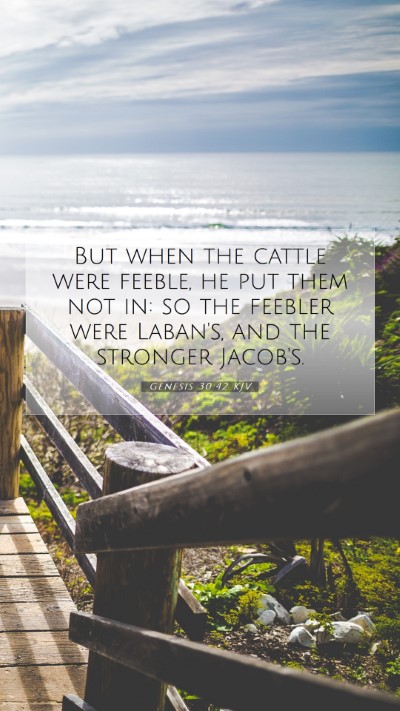Understanding Genesis 30:42
Genesis 30:42 states, "But when the cattle were feeble, he put them not in: so the feebler were Laban's, and the stronger Jacob's." This verse is part of the narrative of Jacob, Laban, and the breeding of livestock, where Jacob employs selective breeding methods to increase his wealth. To fully grasp this verse's implications, it is crucial to explore its context and the theological insights offered by notable public domain commentators.
Bible Verse Understanding
The key themes involved in Genesis 30:42 revolve around God's providence, the principles of fairness, and the intricate workings of human manipulation within God's overarching plan. Jacob's actions indicate a strategic approach to resource management, relying on both natural behavior of livestock and divine favor.
Commentary Insights
-
Matthew Henry's Commentary:
Matthew Henry emphasizes God's sovereignty in the transactions between Jacob and Laban. He reveals that not only was Jacob's approach shrewd, but it also highlighted the blessings God bestows on those who are faithful and diligent in their work. Henry perceives that Jacob's intelligence in managing the breeding of cattle demonstrates a balance between human effort and divine direction, illustrating how God can turn situations around for His chosen ones.
-
Albert Barnes' Notes:
Albert Barnes provides an analysis of the breeding practices mentioned in this verse, discussing their relevance to Jacob's success. He interprets Jacob's selective breeding scheme as an indication of his acumen and labor but also notes how it culminates in a divine blessing upon him. Barnes highlights the enormity of Jacob's growth in wealth, which serves as a testament to God’s blessing in response to Jacob's faithfulness.
-
Adam Clarke's Commentary:
Adam Clarke delves into the technical aspects of the livestock breeding described in Genesis 30:42, adding historical context that emphasizes the practices of the time. Clarke draws attention to divine providence, pointing out that although Jacob employed human methods, it ultimately was God who determined the outcome. He asserts that this verse illustrates how spiritual truths can be exemplified through practical situations.
Theological Themes
Within this verse, several themes reflect broader theological insights:
- God's Providence: The underlying message of divine oversight is prevalent, encouraging readers to recognize that God is intricately involved in the affairs of humanity.
- Human Agency: Jacob's choice to manipulate breeding patterns presents a view on the human role in the interplay between faith and works.
- Morality and Justice: The concept of fairness in Laban's dealings with Jacob incites discussion on moral behavior and God's ultimate justice.
Practical Applications
Understanding Genesis 30:42 helps us grasp how biblical narratives can translate into practical lessons today. Here are some ways to apply this verse:
- Recognizing the importance of wise decision-making in our endeavors, understanding that hard work supported by faith can lead to abundance.
- Reflecting on how God can turn unfavorable circumstances into opportunities for blessing.
- Engaging in ethical practices in personal and professional relationships, inspired by Jacob’s manipulations and Laban's dealings.
Cross References
Additionally, related verses that enrich the understanding of Genesis 30:42 include:
- Genesis 30:31-33 - Discussing the original agreement between Jacob and Laban regarding the livestock.
- Genesis 31:1-13 - Highlighting Jacob’s eventual departure from Laban and the implications of their relationships.
- 1 Corinthians 9:24-27 - Showing the discipline and strategy in a Christian's life that parallels Jacob's approach.
Conclusion
Genesis 30:42 illustrates the confluence of faith, work, and divine intervention. With insights from various public domain commentaries, we can appreciate the deeper meanings and applications of this verse in our lives. Such study serves as an excellent resource for those participating in bible study groups, engaging in online Bible study, or seeking bible study resources. By applying these principles, we attain a more profound understanding of Scripture and its relevance to our daily lives.


